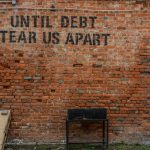Neither a borrower nor lender be. It’s a simple and seemingly useful maxim to live by. Shakespeare likely didn’t expect many adherents in the financial education/advisory media space, but he inadvertantly ended with many.
One of the most famous is Dave Ramsay, an American personal finance guru who strongly advises for debt clearance and repayment. I get where he’s coming from, debt can be ruinous, but not all debt is equal, and the distinction requires elaboration.
I see clients with all different types of debt, most of us have debts of some kind, and it’s useful to differentiate between these.
The nice but subtly painful debt
From one perspective, student loan debt is an incredibly generous form of debt. You only repay it when your earnings exceed the relevant repayment threshold, and it is eventually discharged, either 30 or 40 years after graduation depending on your student loan plan. Mortgage lenders don’t factor it into your balance sheet when assessing you for a mortgage, but they include your repayments when assessing affordability.
Effectively then, it’s a graduate tax set against a balance. Most graduates do not repay in full over their lifetime, and if they are below the repayment income threshold then no repayments are made.
From another perspective though it can be quite painful, it adds 9% on a graduate’s marginal tax rate and the interest rate is often punishingly high. Therefore, many middle-earning graduates make no dent in the capital and the debt cannot be discharged in bankruptcy. Building a financial life with a 9% additional marginal tax rate should be carefully considered by the prospective graduate and their family.
The dangerous debt
This debt has become increasingly widespread and normalised in society. The ongoing Americanisation of our financial lives has seen a rampant increase in credit card debt. It can start carefully enough with a desire to build reward points, or make use of a 0% interest rate, but it can spiral, landing you in a consumption quagmire. I don’t advise against using credit cards, but I frequently meet people who are stuck paying down credit card debt, even on high incomes.
It seems easy enough because the ‘minimum payments’ can be so ridiculously low. You get the experience or item you want now, and pay off the minimum; however, the debt repayment can be a huge line item on a high-earning family’s income statement. They are left no longer paying off the item they purchased but are instead making large payments solely servicing their debt, with the joy of the purchase a long-forgotten memory. Average credit card interest rates are high about 25%. In almost all circumstances credit card debt should be cleared first.
The questionable debt
Personal loans are easily accessible. These are usually unsecured debts, so they aren’t a second charge on property. Major lenders offer these, often more than £5,000, typically capping out at £25,000. The interest rate on personal loans varies significantly with Bank of England rates and is dependent on the creditworthiness of the borrower.
I call this questionable because personal loan debt is context specific. Is there a credible repayment plan in place? Is the interest rate reasonable? Is the loan to fund a property improvement, furniture, or purely for spending money?
The reasons and implications on people’s lives run a range.
The useful debt
Because it is secured against property, a real asset, a mortgage typically offers the lowest interest rates. Without mortgages our financial system would grind to a halt, and the UK’s current first home ownership age would shift from 33 to 53.
I often meet people who consider paying down their mortgager as quickly as they can their priority. For some this is the right approach, as it is a considered strategy that gives them peace of mind. For others though it means they are squeezing themselves financially, failing to save adequately for their retirement, and focused on mortgage overpayments when they have other debts or costs that need their attention more urgently.
It’s worth carefully considering your mortgage approach and allocating your income or capital where it can do the best over the long-term.
Not all debt is created equal
Yes, debt can be dangerous, but it should be used carefully, rather than avoided. All countries, companies large and small, and most households have debt on their balance sheet. Well- managed and considered debt can unlock your financial life, but debt accrued carelessly can act like an anvil.
*If you cannot keep up on repayments on your mortgage, then your home may be repossessed.
Get in touch
We’d love to hear from you.
By contacting Wealth Spring you confirm you have read our privacy notice, which can be found here.


